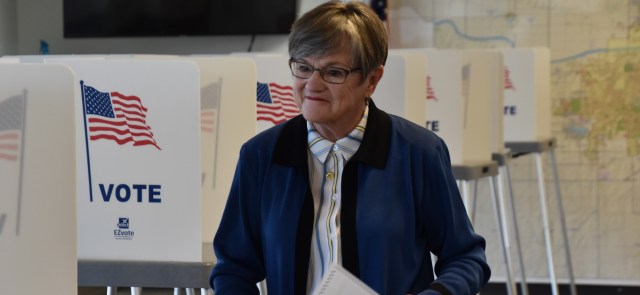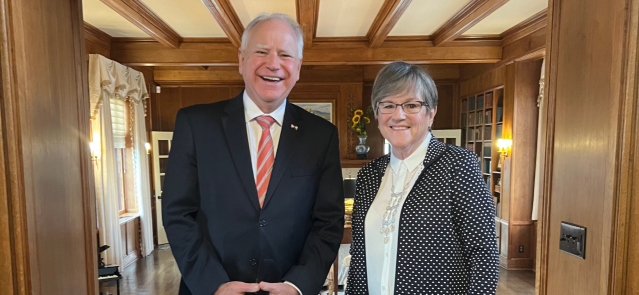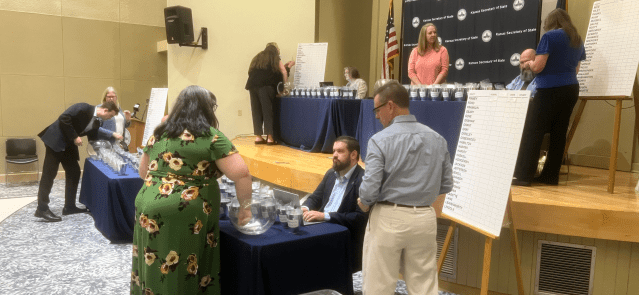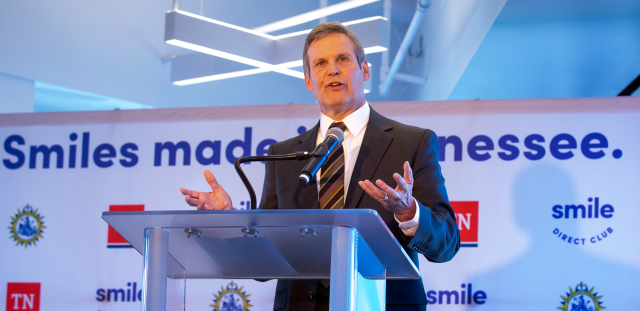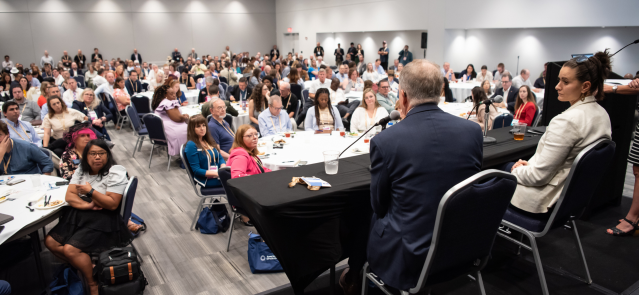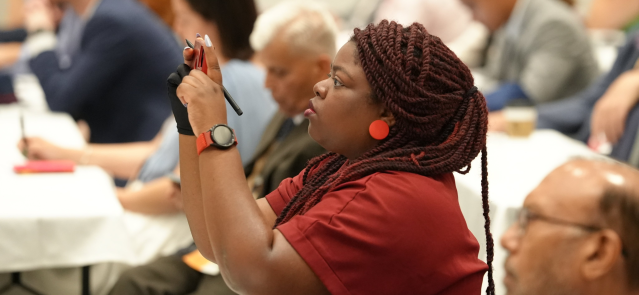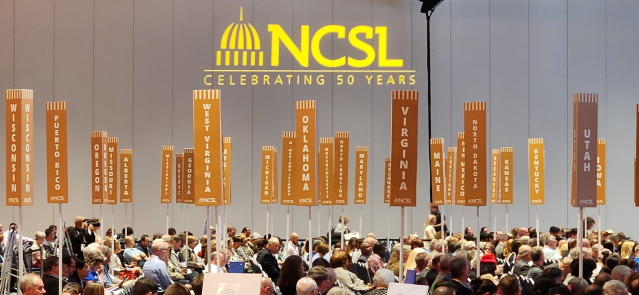Gov. Laura Kelly’s election endorsement gambit has officially paid dividends.
Patrick Schmidt triumphed Tuesday night over Vic Miller and ShaMecha King Simms in a bruising Democratic primary battle for the Senate District 19 seat. Also emerging victorious in the statewide primary election were incumbent Democratic Sens. Marci Francisco, D-Lawrence, and David Haley, D-Kansas City. Wanda Brownlee Paige’s win in a crowded primary field for the District 35 House seat made Kelly four for four on her Middle of the Road political action committee endorsement selections.
Kelly said the primary intent of her PAC is to elect candidates who will work with her while also reaching across the aisle “to get things done for the state of Kansas.”
“So that’s exactly what I did,” Kelly said on Wednesday. “I used it to ensure that people coming in for those seats will be here for the right reason.”
According to the unofficial results tabulated by the Kansas Secretary of State’s Office, Schmidt coasted to the win with 54% (2,479) of the vote. Miller checked in at 34% (1,574) and King Simms finished a distant third with 12% (579). In the Senate District 2 primary, Francisco bested Rep. Christina Haswood, D-Lawrence, 57% (3,744) to 43% (2,805). Meanwhile, Haley knocked off political newcomer Ephren Taylor III, 58% (2,524) to 42% (1,857), for the Senate District 4 seat. Paige secured a landslide victory in a primary field that included incumbent Rep. Marvin Robinson, D-Kansas City.
“I don’t take pleasure in ending somebody’s political career,” Kelly said. “I do take pleasure in the thought of a Legislature that will work together and work with me on behalf of the Kansas people.”
Schmidt advances to face Tyler Wible in the November general election. In the Republican primary for Senate District 19, Wible topped Cynthia Smith 62% to 38%. Francisco, Haley and Paige will run unopposed in the general election.
All eyes on District 19 seat
Kelly’s PAC was heavily invested in the outcome of the District 19 race.
And contentious campaigns waged by Schmidt and House Minority Leader Miller, D-Topeka, garnered more attention than any other primary contest. The race was accentuated by Kelly’s politically risky decision to endorse Schmidt via her PAC. Miller’s attempt to alter tax relief legislation negotiated by Kelly and Republican leaders Ty Masterson and Dan Hawkins in the lead-up to the one-day special session in June was the tipping point that led to a Middle of the Road PAC attack ad targeting Miller, according to Will Lawrence, Kelly’s chief of staff.
Kelly launched the PAC a year ago to elevate moderate legislators, even Republicans, with the intent of vanquishing the GOP’s two-thirds grip on the House and Senate.
Schmidt credited his primary victory to a monthslong door-to-door ground campaign. While Miller also spent ample time knocking on doors in his district, Schmidt far outpaced his opponents in spending. According to campaign finance reports filed with the Kansas Governmental Ethics Commission, Schmidt reported $132,000 in campaign-related expenditures, compared with Miller’s $21,000. King Simms, meanwhile, spent less than $1,000.
Reached by phone Tuesday night, Schmidt told State Affairs he was “excited and humbled by the trust and support that the people of the 19th District” placed in him.
“I was always focused on voters and not what people outside the district were saying,” he said.
Schmidt said he took stock of voters’ top concerns and championed issues such as women’s reproductive rights, the passage of “meaningful” property tax relief and breaking the GOP supermajority.
“That’s what informed our approach and how we messaged our campaign,” he said of his extensive dialogue with constituents. “And it turns out that listening to voters is a good plan.”
July ‘surprise’
A bombshell moment transpired July 22 when Kelly’s PAC dropped the attack ad targeting Miller. The ad, which triggered hurt feelings among a fewHouse Democrats, compared Miller’s voting record on tax legislation with former Gov. Sam Brownback’s controversial tax policy that sent the Kansas economy plunging. The ad centered on a “yes” vote cast by Miller in March 2023 for Senate Bill 169, described as a flat tax proposal championed by Republican leaders. Miller later voted against the legislation after he was placed in “an impossible catch-22 situation” due to the bundling of SB 169 with other bills.
“The purpose of the governor’s Middle of the Road PAC is to elect common-sense candidates that want to do the right thing and aren’t selfish politicians,” Lawrence told State Affairs last month. “And when you have people like Vic Miller and Marvin Robinson who want to sit in these Democratic seats and do their own bidding and not work for the people of Kansas and their constituents, there needs to be change.”
During a candidate forum on July 13, Schmidt said Miller “coddles extremist Republicans” and attacked him on his voting record, specifically tax policy. Because Schmidt didn’t specify the tax bill he was referencing, the line of attack seemingly caught Miller off guard, as the forum ended without the House minority leader offering a counter-reply.
“This was personal for me because my parents were really hurt by the Brownback tax experiment and extremists in the state Legislature,” Schmidt said.
Reached by phone Tuesday night, Miller said he wasn’t in a great mood after losing to Schmidt.
“I just lost,” Miller said. “How do you think I feel?”
Paige ‘blessed’ after win
Paige’s victory Tuesday ended a contentious tenure for Robinson after one term.
Paige, a retired teacher and member of the Kansas City, Kansas school board, garnered nearly half the vote in the four-person race.
“I feel blessed,” Paige told State Affairs Tuesday night. “I know God is good. That was my prayer: let me do this so that I can help the people. … A lot of people believed in what I was trying to do, so now it’s my turn to turn around and to make good on what I said I was going to try to do.”
Robinson, who succeeded his cousin and longtime Democratic Rep. Broderick Henderson in 2023, regularly voted with Republicans during his two years in Topeka. He quickly alienated himself from other Democrats, culminating with Kelly’s decision to back Paige in the primary.
Paige said voters in the Wyandotte County-based 35th District have been disappointed and hurt by previous lawmakers’ broken promises. She hopes to restore their faith in the system, “to think that it can and believe that it will work.”
Voters sent a message by electing her, Paige said.
“It’s not going to be easy, but if we all chip in and fight and just keep fighting, it can work,” she said. “It’s going to take some time. That’s something I had to learn with the school board. It doesn’t just happen like that. Then you’ve just got to keep plugging away.”
Francisco vs. Haswood
Tuesday marked the first time in Francisco’s nearly 20-year Senate tenure that experienced a primary. In June, she expressed surprise that Haswood had opted to vacate a safe House seat in a Democratic stronghold for a difficult primary challenge. Francisco was also pulled into an election fiasco, one that required the intervention of Secretary of State Scott Schwab, who ultimately invalidated an attempt by a GOP operative to place Francisco and Echo Van Meteren on the November ballot under the No Labels Party.
Believing her work spoke for itself, Francisco said she remained confident about her reelection prospects. But she said she was also a bit nervous because of recent redistricting that eliminated the Lecompton and Jefferson County constituencies from her new district.
“Because I know those Democrats so well,” she said with a chuckle.
Francisco added that she also had to quickly adapt to a compressed primary schedule. For her, Tuesday’s victory represents the realization of a “dream come true,” as the win enables her to appear on the general election ballot along with Democratic presidential nominee Kamala Harris.
Haswood, the only Native American in the Legislature, posted a video on her X account thanking supporters in advance of Tuesday’s vote. In the video, Haswood noted that running for office as a woman and a person of color is hard, and that voters could make history by electing the first Native American to the state Senate.
“Thank you for letting me be the representation I’ve never had,” she said in the video. “I hope my journey has inspired many of you to run for office, or at least vote.”
Haley reigns
Like Francisco, Haley faced his first primary challenge in his Senate career spanning to 2001. He said 20-year-old Ephren Taylor III’s formidable challenge surprised him. Haley told State Affairs Tuesday night he had hoped for an even more decisive victory because he has “represented Wyandotte County longer than Ephren has been alive.”
“That’s actually a quote he used against me,” Haley said, while also complimenting Taylor. “He ran a spectacular campaign.”
Haley said his campaign reflected the needs of “a diverse Kansas City, Kansas, constituency,” noting that reproductive rights and criminal justice reform were issues generating the most discussion.
“I’m in ‘campaign mode’ and interacting with the community all the time ,” he said. “And I think I do pretty well at that.”
Haley added that he was “very appreciative” to have secured Kelly’s PAC endorsement. As far as endorsements for the November general election, Kelly said her PAC will engage in “the standard vetting process, make contributions and endorse when the time is right.”
Statehouse Reporter Brett Stover contributed to this story.
Matt Resnick is a statehouse reporter at State Affairs Pro Kansas/Hawver’s Capitol Report. Reach him at [email protected].
